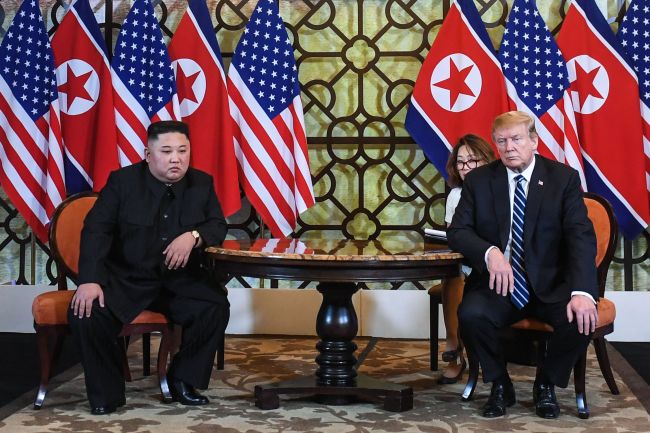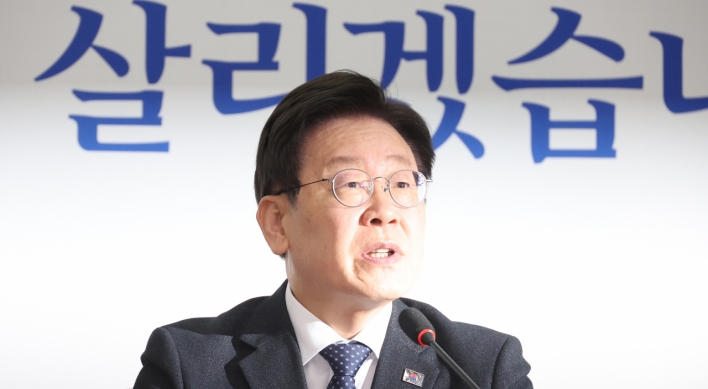Seoul’s mediator role in US-NK relations at critical juncture
By Choi He-sukPublished : March 12, 2019 - 16:09
President Moon Jae-in once again hopes to bridge the gap between North Korea and the US, but experts say the goal may be too high and room to maneuver too small.
Seoul has had a significant role in facilitating the unprecedented level of US-North Korea dialogue seen over the past year. It was Moon’s special envoys to Pyongyang who delivered North Korean leader Kim Jong-un’s message to US President Donald Trump in March last year, which was instrumental in initiating subsequent developments between North Korea and the US. It was also only after the September inter-Korean summit in Pyongyang that US-North Korea dialogue regained traction after making little progress since the US-North Korea summit in Singapore on June 12.
Since the Feb. 27-28 summit in Hanoi fell apart, Moon has stressed the mediating role Seoul must play.
Seoul has had a significant role in facilitating the unprecedented level of US-North Korea dialogue seen over the past year. It was Moon’s special envoys to Pyongyang who delivered North Korean leader Kim Jong-un’s message to US President Donald Trump in March last year, which was instrumental in initiating subsequent developments between North Korea and the US. It was also only after the September inter-Korean summit in Pyongyang that US-North Korea dialogue regained traction after making little progress since the US-North Korea summit in Singapore on June 12.
Since the Feb. 27-28 summit in Hanoi fell apart, Moon has stressed the mediating role Seoul must play.

At a National Security Council meeting on March 4, Moon called on concerned government agencies to seek ways to narrow differences between the US and North Korea and to aid US-North Korea dialogue “through improvements in inter-Korean relations.”
Moon’s orders were soon followed by talk suggesting that Seoul might be toying with the idea of resuming some inter-Korean economic projects such as the Kaesong industrial park.
“(Related issues) will be reviewed within the framework of UN sanctions, and discussed with the US,” a Cheong Wa Dae official said in response to rumors, adding that any review of inter-Korean projects would focus on the benefits that North Korea would gain from denuclearization.
Since Moon gave the orders, the situation has taken a turn for the worse. US media have reported movement in key North Korean missile and nuclear sites, Tongchang-ri and Sanum-dong, citing satellite images.
According to the reports, North Korea appears to have built a rocket-launching facility at Tongchang-ri, while increased movement has been detected in Sanum-dong, a nuclear research facility on the outskirts of Pyongyang.
Pyongyang’s intentions remain unclear, but analysts say the news will strengthen sentiment within the Trump administration that it is too early to lift sanctions. After the summit, Trump stated that Kim Jong-un had demanded the total removal of all sanctions in return for the dismantlement of the Yongbyon nuclear facility and that Trump could not accept those conditions.
Speaking in a television interview on Sunday (Korea time), US national security adviser John Bolton reiterated that Trump had no intention of agreeing to an action-for-action denuclearization plan.
Vowing that Trump would not repeat the mistakes of previous US administrations by “assuming that North Koreans are going to automatically comply when they undertake obligations,” Bolton said Trump’s aim was to persuade the North to take “the big deal -- complete denuclearization.”
Bolton reiterated the point a number of times, saying Trump would not be “falling for North Korean action-for-action ploy.”
While Cheong Wa Dae reiterates the point that Seoul and Washington are cooperating closely and denies there has been any rift between the allies, some experts here say the Moon administration’s idea of mediating between the US and North Korea is misguided.
“Traditional mainstream of the US, and Trump’s foreign policy direction, alliance policies -- which includes North Korean denuclearization negotiations -- do not match,” said Konyang University professor emeritus Kim Tae-woo, former head of the Korea Institute for National Unification.
He went on to say that not only is it impossible for Trump to go against the mainstream indefinitely, but that it is because he is aware of such views that he ended the Hanoi summit without giving the North a deal.
“(Moon mediating) is not possible. If (Seoul) wants South Korea-US cooperation then (the Moon administration) should go in the opposite direction to what it is doing now.”
He pointed to the North’s use of the term “denuclearization of the Joseon (Korean) Peninsula” as opposed to denuclearization of North Korea as evidence of Pyongyang’s intentions.
Saying “denuclearization of the Joseon Peninsula” refers to the complete removal of US nuclear deterrence with regard to South Korea, he said Kim Jong-un’s demands at the Hanoi summit made it clear that Pyongyang had no intention of denuclearizing in the sense expected by the international community.
He added that Pyongyang was likely to refuse denuclearization without extreme conditions such as the withdrawal of US Forces Korea and the end of the South Korea-US alliance.
“Expecting the North to give up nuclear weapons before that, in return for sanctions relief and economic aid, is very naive,” he said.
Regardless of such views, which many conservatives share, Cheong Wa Dae is hopeful that Moon will succeed in reviving talks.
“(Trump and Kim Jong-un) both trust President Moon Jae-in. As we have a clear understanding of the US message, (Seoul) will clearly convey the message to North Korea,” a Cheong Wa Dae official told reporters last week.
While Moon administration officials appear optimistic, experts here say the situation is more complex, with little room for Moon to maneuver.
“North Korea (showing movement in) Tongchang-ri and Sanum-dong, I think that is a signal to the US to send negotiators,” said Kim Hyun-wook, a professor at the National Korea Diplomatic Academy.
The professor went on to say the North is unwilling to denuclearize on a level demanded by the US, while at the same time it wants to keep dialogue alive but is unable to make that request.
“(The North) is sending a complex signal. This is what South Korea needs to do, to bring the US and North Korea to begin working-level talks. (Helping the two sides to) narrow their differences comes after that,” he said.
“The important thing is to resume negotiations. (The two sides’) positions will not match, but it was wrong to hope for the matter to be easily resolved in the top-down manner,” he said, adding that concerned parties must be prepared for prolonged working-level talks.
By Choi He-suk (cheesuk@heraldcorp.com)







![[Hello India] Hyundai Motor vows to boost 'clean mobility' in India](http://res.heraldm.com/phpwas/restmb_idxmake.php?idx=644&simg=/content/image/2024/04/25/20240425050672_0.jpg&u=)










